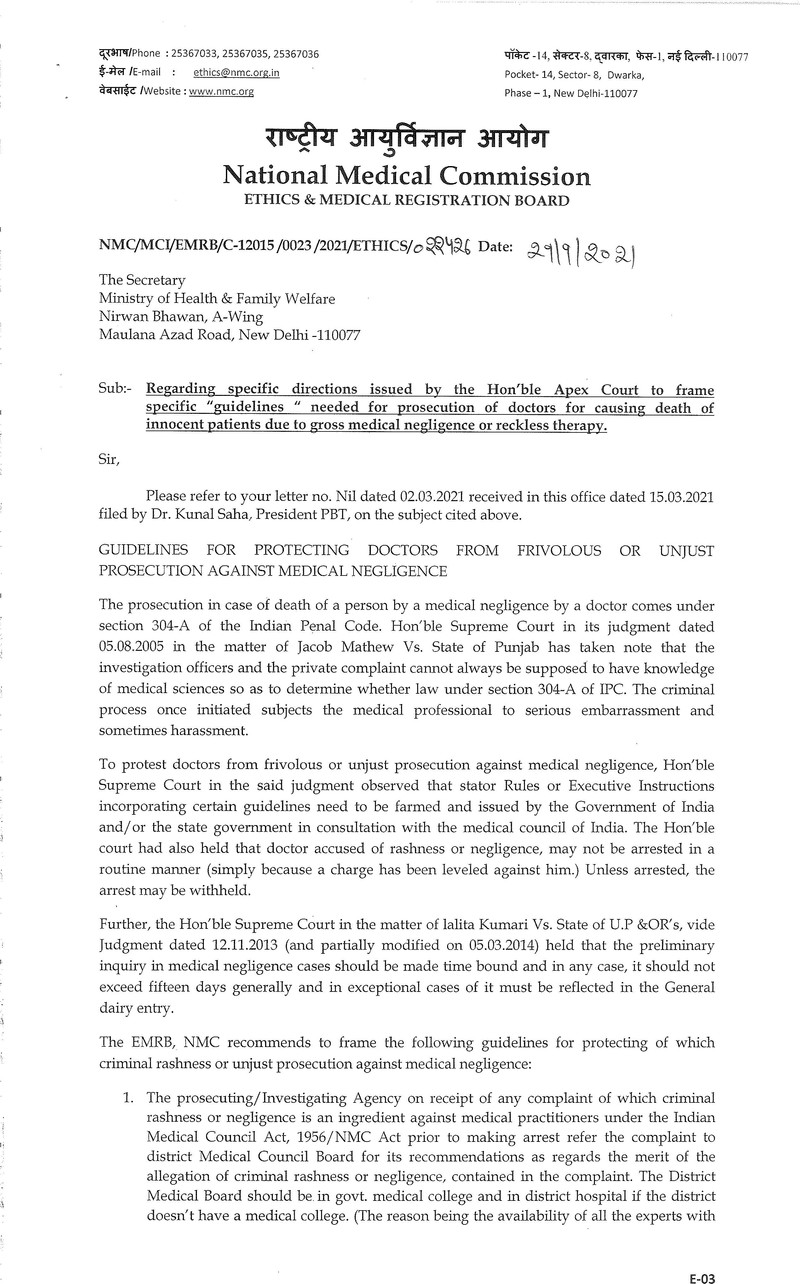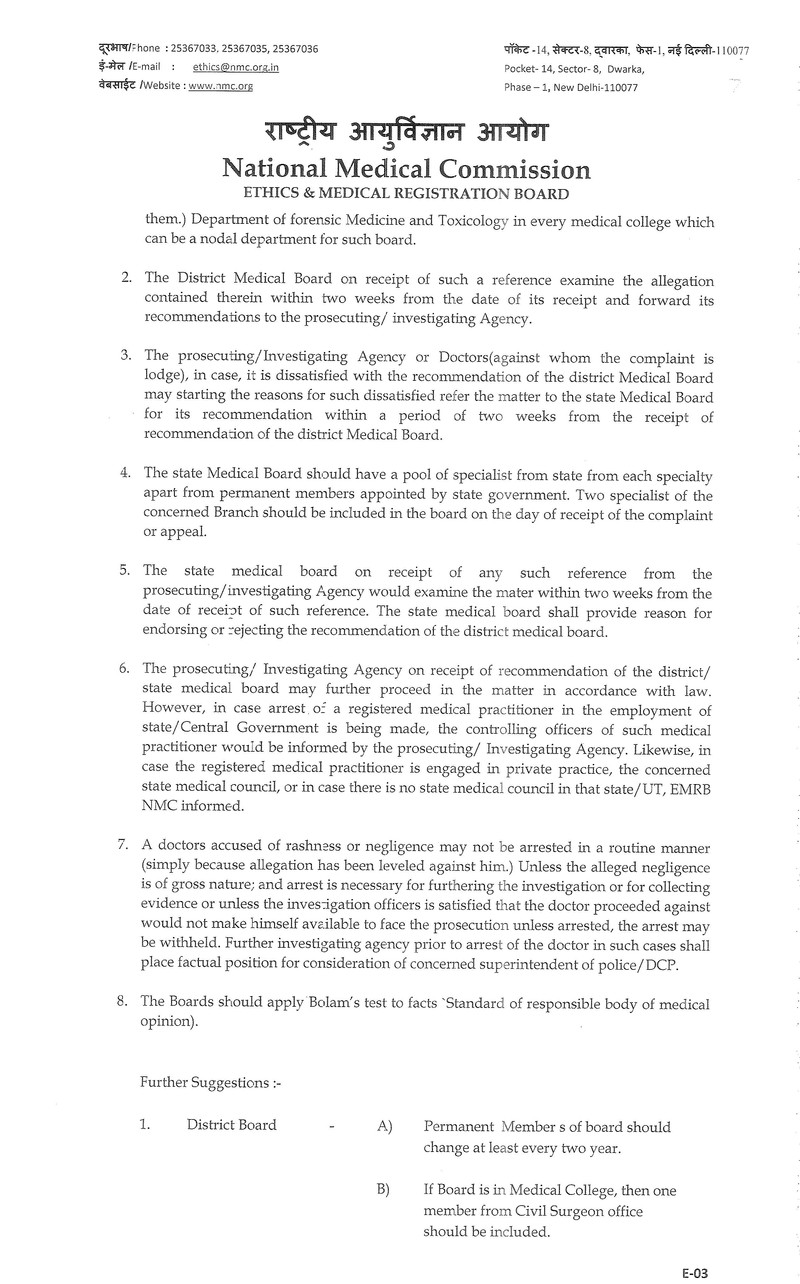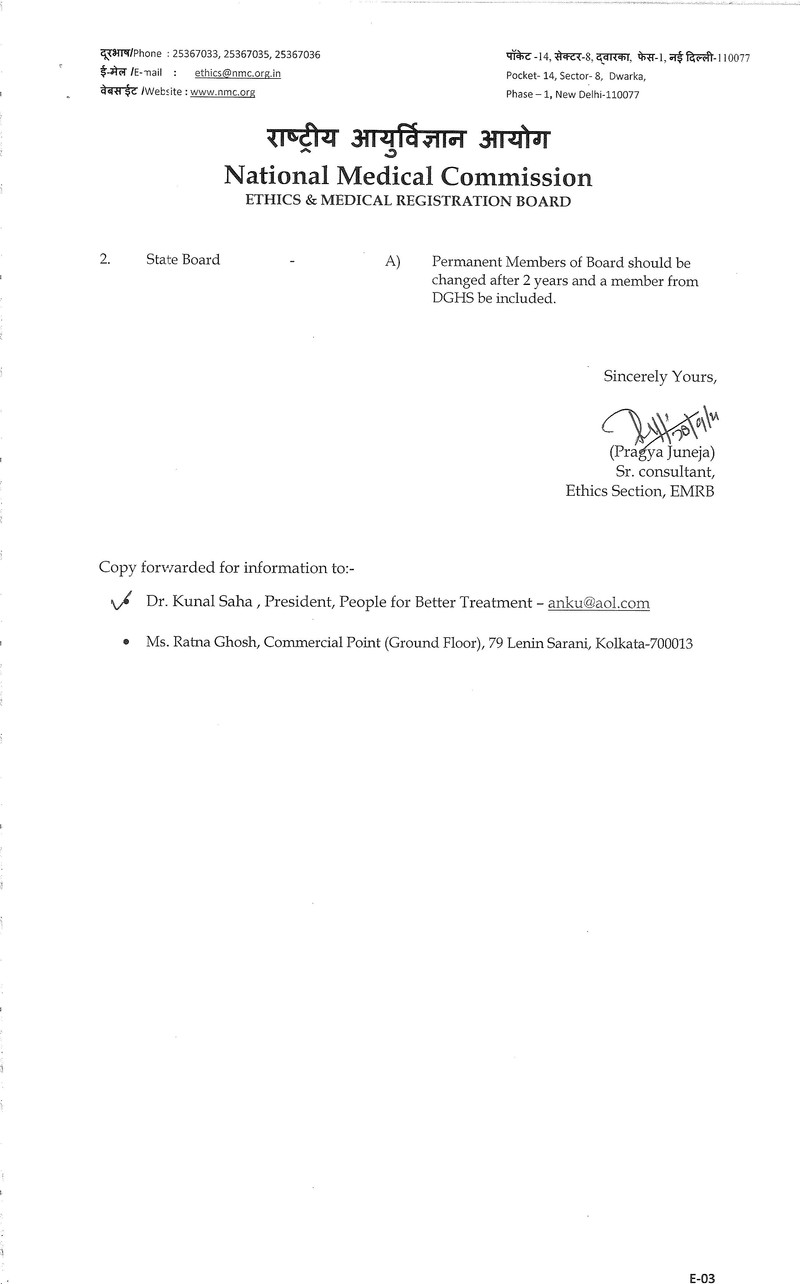Prosecuting doctors for criminal negligence: NMC frames new guidelines
M3 India Newsdesk Dec 02, 2021
The Ethics and Medical Registration Board (ERMB), which operates under the National Medical Commission (NMC), has recently developed certain recommendations that set out the punishment of physicians for causing the death of innocent people as a result of gross medical negligence or reckless treatment. This article throws light on the principles to safeguard physicians from unfair prosecution against medical neglect.
The move comes after receiving a letter from Dr Kunal Saha, President People for Better Treatment (PBT), requesting compliance with the Supreme Court's directives.
In 2005, the Supreme Court said that:
"Statutory rules or executive orders including certain guidelines must be framed and issued by the Government of India and/or state governments in consultation with the Medical Council of India."
The National Medical Council (NMC) sent a letter in response, to the Secretary of Ministry of Health and Family Welfare (MoHFW). Meanwhile, the court established specific rules for future prosecutions of physicians for offences including criminal rashness or criminal negligence.
Since Jacob Mathew vs. the State of Punjab dated August 5, 2005, when the Apex Court issued provisional rules/observations for declaring a doctor guilty of "criminal negligence" under the Indian Penal Code (IPC Section 304A), these guidelines developed by NMC shield physicians from frivolous or unfair prosecution against medical negligence.
The recommendations detail the full process for protecting physicians under IPC 304A and propose for the establishment of a specialised district medical board to adjudicate cases of physician carelessness.
The new rules mandate that upon receipt of a complaint under the Indian Medical Council Act, 1956, the case be referred to the district Medical Council Board for advice before any arrest is made. Additionally, the problem may be referred to the State Medical Council Board, and the rules state plainly that a doctor accused of medical malpractice may not be arrested routinely.
Rules and regulations
Section 304-A of the Indian Penal Code governs the prosecution of doctors who cause the death of a patient via medical negligence. The Supreme Court, in its judgement dated 05.08.2005 in the case of Jacob Mathew vs. the state of Punjab, recognised that investigators and private complainants cannot always be assumed to possess knowledge of medical sciences in order to determine whether a law under section 304-A of the IPC has been violated.
Once the criminal procedure is launched, the medical practitioner faces significant humiliation and, in some cases, harassment. The Honourable Supreme Court noted in the aforementioned decision that new rules or executive instructions comprising specific guidelines must be developed and published by the Government of India and/or the state government in conjunction with the Indian Medical Council in order to safeguard practitioners against frivolous or unfair prosecution for medical negligence.
Additionally, the honourable court stated that a physician accused of haste or carelessness may not be arrested routinely (just because a charge has been filed against him).
According to a judgement dated 12.11.2013 (and partly modified on 05.03.2014) by the Supreme Court in the case of Lalita Kumari versus the state of U.P. & Ors, the preliminary investigation in medical negligence cases shall be time-constrained and in any case, should not exceed fifteen days usually, and in extreme situations, it must be reflected in the general diary entry.
Principles for protecting physicians against improper prosecution
While noting that "criminal procedure once began puts physician to considerable humiliation and sometimes harassment," NMC's EMRB suggested the following principles for safeguarding physicians from criminal rashness or wrongful prosecution against medical neglect:
- The prosecuting/investigating agency on receipt of any complaint of which criminal rashness or negligence is an ingredient against medical practitioners- Under the Indian Medical Council Act, 1956/NMC Act, prior to making an arrest, refer the complaint to the district Medical Council Board for its recommendations with regards to the merit of the allegation of criminal rashness or negligence, contained in the complaint. The District Medical Board should be in a government medical college and in the district hospital. If the district doesn't have a medical college (the reason is the availability of all the experts with them), the department of forensic medicine and toxicology in every medical college can be a nodal department for such a board.
- The District Medical Board on receipt of such a reference must examine the allegation contained therein within two weeks from the date of its receipt and forward its recommendations to the prosecuting/ investigating agency.
- The prosecuting/investigating agency or doctors (against whom the complaint is lodged), if dissatisfied with the recommendation of the District Medical Board may state the reasons for such dissatisfaction, refer the matter to the State Medical Board for its recommendation within a period of two weeks from the receipt of the recommendation of the District Medical Board.
- The state medical board should have a pool of specialists from the state, from each speciality apart from permanent members appointed by the state government. Two specialists of the concerned branch should be included in the board on the day of receipt of the complaint or appeal.
- The state medical board on receipt of any such reference from the prosecuting/investigating agency would examine the matter within two weeks from the date of receipt of such a reference. The state medical board shall provide a reason for endorsing or rejecting the recommendation of the district medical board.
- The prosecuting, investigating agency on receipt of the recommendation of the district/state medical board may further proceed in the matter in accordance with the law. However, in the case of arrest of a registered medical practitioner in the employment of state/central government is being made, the controlling officers of such medical practitioner would be informed by the prosecuting/investigating agency. Likewise, in case the registered medical practitioner is engaged in private practice, the concerned state medical council should be informed. In case there is no state medical council in that state/UT, EMRB NMC should be informed.
- A doctor accused of rashness or negligence may not be arrested in a routine manner simply because an allegation has been levelled against him. The arrest may be withheld unless the alleged negligence is of gross nature, and arrest is necessary for furthering the investigation or for collecting evidence or unless the investigation officers are satisfied that the doctor proceeded against, or the doctor would not make himself/herself available to face the prosecution unless arrested. Further, the investigating agency prior to the arrest of the doctor in such cases shall place a factual position for consideration of the concerned superintendent of police/DCP.
- The board should apply Bolam's test to facts 'Standard of a responsible body of medical opinion'. Additionally, the instructions indicate that in the instance of the district board,
- Members of the board of directors should rotate at least every two years.
- If the board is located at a medical college, one member from the office of the civil surgeon should be involved.
- Additionally, in the case of the State Board, permanent members of the board should be replaced every two years, and a representative from DGHS should be included.



Disclaimer- The views and opinions expressed in this article are those of the author's and do not necessarily reflect the official policy or position of M3 India.
The author is a practising super specialist from New Delhi.
-
Exclusive Write-ups & Webinars by KOLs
-
Daily Quiz by specialty
-
Paid Market Research Surveys
-
Case discussions, News & Journals' summaries